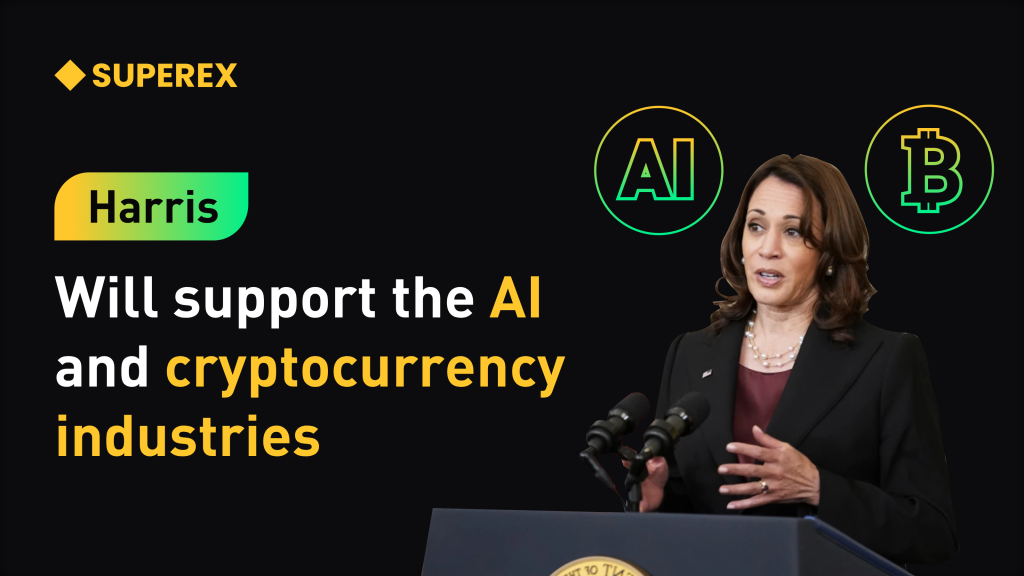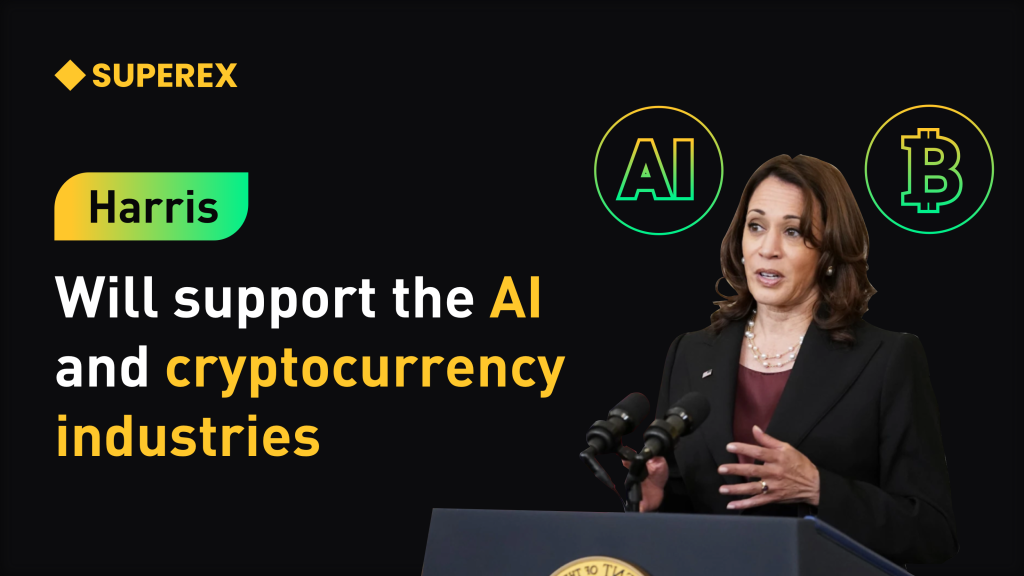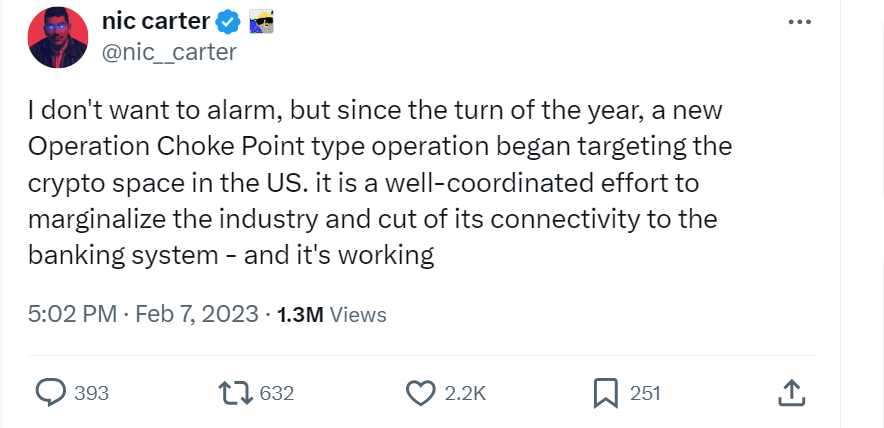SuperEx丨Harris: Committed to Supporting AI and the Cryptocurrency Industry

OnSeptember 22, Vice President Kamala Harris made headlines by pledging her support for increased investment in artificial intelligence (AI) and the cryptocurrency sector if she is elected as President. Speaking to donors in New York City, she outlined her economic agenda, emphasizing the need to foster innovation while ensuring regulatory frameworks that protect consumers and investors.
At a fundraising event held at Cipriani Wall Street in Manhattan, Harris stated, “I will bring together labor, small business founders, innovators, and large corporations. Together, we will invest in America’s competitiveness, and in America’s future. We will encourage innovative technologies like artificial intelligence and digital assets, while safeguarding our consumers and investors.”
This speech marked the first time Harris, as a Democratic presidential candidate, had publicly expressed her stance on cryptocurrencies. Investors, technologists, and crypto enthusiasts are now eager to see whether her approach will diverge from that of President Joe Biden.
- Click to register SuperEx
- Click to download the SuperEx APP
- Click to enter SuperEx CMC
- Click to enter SuperEx DAO Academy — Space

Harris’s Vision: A Dual Focus on Innovation and Protection
Harris’s remarks underscored a critical balancing act between fostering technological advancements and ensuring robust regulatory oversight. She indicated that the federal government must step up its role in guiding these technologies, which are becoming increasingly central to the global economy. Her comments resonated with many in both the AI and cryptocurrency industries, sectors often characterized by rapid innovation that outpaces existing regulatory frameworks.
For Harris, the key challenge will be to provide a regulatory environment that allows cutting-edge technologies to thrive without sacrificing security or consumer trust. This echoes ongoing discussions about the need for the United States to remain competitive on the global stage, particularly as countries like China pour resources into AI and digital currencies.
AI and Crypto: Engines for Economic Growth
Harris’s remarks signaled that she views both AI and cryptocurrencies as critical to the next phase of economic growth in the U.S. The AI sector, in particular, is already transforming industries from healthcare to finance, with machine learning algorithms making operations more efficient and uncovering new insights from vast amounts of data. Cryptocurrency, meanwhile, represents a radical shift in how value is transferred and stored, with the potential to disrupt traditional financial systems.
If Harris is successful in her presidential bid, her administration could introduce policies designed to boost research, development, and infrastructure in these areas. For AI, this might include federal grants for innovation hubs or tax incentives for companies investing in AI solutions. For the crypto industry, it could mean a more defined regulatory framework, allowing for greater clarity and confidence among investors.
How Harris Could Differ From Biden
As Vice President under Biden, Harris has not always had the opportunity to express her personal stance on key issues like cryptocurrency regulation. Biden’s administration has been characterized by a somewhat cautious approach to cryptocurrencies, marked by increased scrutiny from agencies like the Securities and Exchange Commission (SEC) and the Department of Justice. Under his administration, there has been a clear focus on protecting consumers from the risks associated with digital assets, such as fraud and market manipulation.
Harris, however, has indicated that while consumer protection is a priority, her administration would likely put more emphasis on promoting innovation. This could signal a more proactive and supportive stance on emerging technologies, recognizing them as vital components of the modern economy rather than viewing them primarily through the lens of risk management.
Harris’s comments suggest a nuanced understanding of the need to strike a balance between fostering innovation and implementing safeguards. While the details of her potential policies remain to be seen, the promise of greater support for the AI and crypto sectors is likely to be welcomed by proponents of technological progress.
The Regulatory Landscape for AI and Crypto
Regulation has always been a contentious issue in the tech world. Both AI and cryptocurrency present unique challenges for lawmakers and regulators. AI, for example, raises ethical concerns about data privacy, algorithmic bias, and the potential for job displacement due to automation. On the other hand, cryptocurrencies, which operate on decentralized networks, challenge traditional financial regulations and require policymakers to rethink how to apply existing rules to new technologies.
Harris’s emphasis on regulation that protects consumers and investors reflects a growing awareness that these technologies need to be properly managed to prevent harm while still enabling growth. However, her approach is likely to differ from more restrictive regulatory models seen in countries like China, which have clamped down on cryptocurrencies. Harris appears to be positioning the U.S. as a leader in fostering responsible innovation, seeking to develop frameworks that promote growth rather than stifle it.
For AI, this could mean the introduction of ethical guidelines that govern how algorithms are used, ensuring that companies use the technology in a way that aligns with public interests. For cryptocurrency, her administration might focus on creating clearer regulatory standards that encourage growth in the industry while preventing the illicit use of digital currencies.
The Role of the Private Sector
A key element of Harris’s strategy, as indicated by her speech, will be collaboration between the government and the private sector. By bringing together stakeholders from across the economy — entrepreneurs, labor unions, and large corporations — her plan seeks to mobilize the full power of American innovation.
This approach could lead to new public-private partnerships aimed at driving advancements in AI and digital assets. Such partnerships could include initiatives that create AI training programs to equip workers with the skills they need in an increasingly automated world. For cryptocurrencies, it could mean working with blockchain companies to develop protocols that make digital transactions more secure and scalable.
Global Implications of Harris’s Agenda
Harris’s stance on AI and cryptocurrency does not exist in a vacuum. The global race to lead in these technologies is heating up, with countries around the world making significant investments. China, in particular, has made massive strides in both AI and the development of its own digital currency, the Digital Yuan. Europe, too, has been proactive in establishing regulatory frameworks for AI and digital assets.
If Harris’s policies can stimulate growth in these sectors, the U.S. could solidify its position as a global leader in AI and crypto innovation. This would not only boost the U.S. economy but also reinforce its influence on the global stage, especially in shaping the future of these technologies.
Conclusion
Vice President Kamala Harris’s remarks on supporting AI and the cryptocurrency industry signal a forward-thinking approach to the U.S. economy. By emphasizing both innovation and protection, she aims to foster a balanced regulatory environment that allows cutting-edge technologies to thrive. If elected, her policies could spur growth in these sectors, positioning the U.S. as a global leader in both artificial intelligence and digital assets.
As the race for innovation intensifies, Harris’s vision for AI and cryptocurrency could play a crucial role in shaping the future of the American economy. Investors, innovators, and consumers alike will be closely watching how her agenda unfolds and what it could mean for the broader tech landscape.







Responses